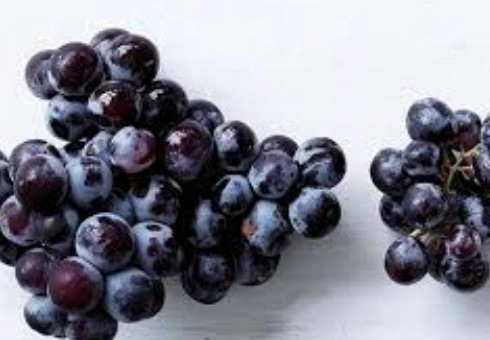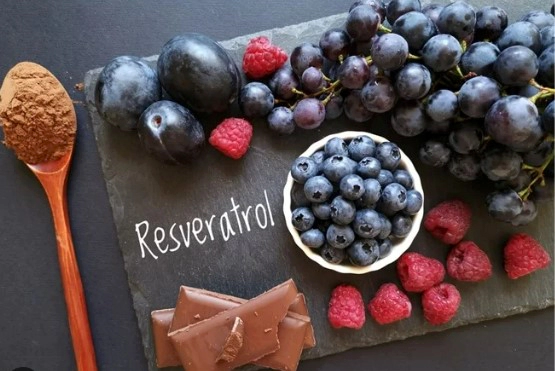Welcome to our comprehensive guide on the incredible benefits of resveratrol. In recent years, this remarkable compound has gained significant attention for its potential to promote overall health and well-being. Derived from various natural sources, resveratrol has been studied extensively for its antioxidant, anti-inflammatory, and anti-aging properties. In this article, we will delve into the multitude of benefits this compound has to offer, backed by scientific research and expert opinions. So, let's explore the fascinating world of resveratrol and discover how it can positively impact your life.


Take a look at the fantastic diet benefits of resveratrol.
What Is Resveratrol?
Exploring the Origins and Sources
Resveratrol is a natural compound classified as a polyphenol, belonging to a larger family of plant compounds known as stilbenes. It is primarily found in the skin of grapes, berries, and various other plants. The compound acts as a defense mechanism for these plants, protecting them from environmental stressors and pathogens. In recent years, resveratrol has attracted significant attention due to its potential health benefits.
The Chemical Structure of Resveratrol
Resveratrol possesses a unique chemical structure that contributes to its remarkable properties. It consists of two aromatic rings connected by a double bond, with hydroxyl groups attached at specific positions. This configuration enables resveratrol to act as a potent antioxidant and exert various physiological effects within the human body.


Take a look at the fantastic diet benefits of resveratrol.
Resveratrol Benefits
Resveratrol offers a wide range of benefits that positively impact different aspects of health. Let's explore some of the most notable benefits associated with this remarkable compound.
Cardiovascular Health
Resveratrol has been extensively studied for its potential to promote cardiovascular health. Research suggests that it can help protect against heart disease by reducing inflammation, preventing the oxidation of LDL cholesterol, improving blood flow, and supporting healthy blood pressure levels. These effects make resveratrol a valuable ally in maintaining a healthy heart.
Anti-Aging Effects
The anti-aging effects of resveratrol have captivated researchers and health enthusiasts alike. By combating oxidative stress, which plays a significant role in aging, resveratrol helps protect cells from damage and promotes longevity. It also enhances cellular repair mechanisms and supports healthy DNA function, contributing to a youthful and vibrant appearance.
Cognitive Enhancement
Emerging research indicates that resveratrol may have cognitive-enhancing properties. It has shown promising results in improving memory, learning, and overall brain function. Resveratrol's neuroprotective effects and its ability to combat neurodegenerative diseases make it an intriguing compound for those seeking to optimize brain health.
Weight Management
For individuals looking to manage their weight effectively, resveratrol can be a valuable asset. Studies suggest that it can boost metabolism, increase fat oxidation, suppress appetite, and improve insulin sensitivity. By targeting multiple aspects of weight management, resveratrol offers a holistic approach to achieving and maintaining a healthy weight.
Anti-Cancer Properties
Resveratrol exhibits intriguing anti-cancer properties, making it a subject of intense research. Studies have demonstrated its potential to inhibit tumor growth, induce cancer cell death, prevent metastasis, and enhance the effectiveness of chemotherapy. While more research is needed, resveratrol holds promise as a complementary strategy in the fight against cancer.
Blood Sugar Regulation
Managing blood sugar levels is crucial for overall health, particularly for individuals with diabetes or those at risk of developing the condition. Resveratrol has shown potential in improving insulin sensitivity, lowering blood glucose levels, and reducing the risk of diabetic complications. These benefits make it an exciting avenue for diabetes management.


Take a look at the fantastic diet benefits of resveratrol.
Resveratrol and Heart Health
Protecting Against Cardiovascular Diseases Cardiovascular diseases, such as heart attacks and strokes, are a leading cause of mortality worldwide. Resveratrol's anti-inflammatory and antioxidant properties help protect against these diseases by reducing inflammation, preventing the oxidation of LDL cholesterol, and inhibiting the formation of blood clots.
Lowering Cholesterol Levels
High levels of LDL cholesterol contribute to the development of atherosclerosis, a condition characterized by the accumulation of plaque in the arteries. Resveratrol has been shown to lower LDL cholesterol levels, thereby reducing the risk of plaque formation and supporting heart health.
Promoting Healthy Blood Pressure
Maintaining healthy blood pressure is essential for cardiovascular well-being. Resveratrol has been found to enhance nitric oxide production, a molecule that relaxes and widens blood vessels, thereby promoting healthy blood flow and supporting optimal blood pressure levels.
Enhancing Circulation
Good circulation is vital for the efficient transport of oxygen and nutrients throughout the body. Resveratrol's ability to improve blood flow and enhance circulation ensures that organs and tissues receive the necessary nourishment for optimal functioning.


Take a look at the fantastic diet benefits of resveratrol.
The Anti-Aging Effects of Resveratrol
Fighting Oxidative Stress
Oxidative stress, which occurs due to an imbalance between free radicals and antioxidants in the body, is a significant contributor to cellular damage and the aging process. Resveratrol possesses potent antioxidant properties that help neutralize free radicals and reduce oxidative stress. By combating oxidative stress, resveratrol can slow down the aging process at the cellular level, promoting healthier and more youthful cells.
Boosting Cellular Repair Mechanisms
As we age, our cellular repair mechanisms become less efficient, leading to a decline in overall cell health. Resveratrol has been shown to activate certain genes and proteins involved in cellular repair and maintenance. By stimulating these repair mechanisms, resveratrol enhances the body's natural rejuvenation processes, promoting healthier and more resilient cells. This can have a positive impact on the overall aging process and help maintain a more youthful appearance.
Preserving Skin Youthfulness
The skin is often one of the first areas to show visible signs of aging. Resveratrol offers several benefits in preserving skin youthfulness. Its antioxidant properties help protect the skin from oxidative stress and damage caused by free radicals. By neutralizing free radicals, resveratrol helps reduce the formation of wrinkles, fine lines, and other signs of aging.
Additionally, resveratrol supports collagen production in the skin. Collagen is a protein responsible for maintaining skin elasticity and firmness. As we age, collagen production naturally decreases, leading to sagging skin and the formation of wrinkles. Resveratrol can help stimulate collagen synthesis, promoting a more youthful and resilient skin texture.
Furthermore, resveratrol has anti-inflammatory effects, which can help soothe and calm the skin. Inflammation can contribute to skin aging and the development of various skin conditions. By reducing inflammation, resveratrol can help maintain a more youthful and even complexion.
To harness the potential anti-aging effects of resveratrol, incorporating resveratrol-rich skincare products or consuming foods and supplements high in resveratrol may be beneficial. However, it's important to note that individual results may vary, and consulting with a dermatologist or skincare professional is recommended for personalized advice and recommendations.

Take a look at the fantastic diet benefits of resveratrol.
Resveratrol and Cognitive Enhancement
Neuroprotective Effects
Resveratrol has demonstrated neuroprotective effects, which means it helps protect brain cells from damage and degeneration. It can reduce inflammation, modulate neurotransmitter activity, and enhance the brain's antioxidant defenses, all of which contribute to better brain health.
Improving Memory and Learning
One of the most intriguing benefits of resveratrol is its ability to improve memory and enhance learning. Research suggests that resveratrol can enhance synaptic plasticity, which is essential for forming and consolidating memories. By promoting optimal brain function, resveratrol may enhance cognitive abilities and support mental sharpness.
Combating Neurodegenerative Diseases
Neurodegenerative diseases, such as Alzheimer's and Parkinson's, pose significant challenges to individuals and their families. Resveratrol's neuroprotective properties and its potential to reduce the buildup of harmful proteins in the brain make it an area of active research in the quest for effective treatments and preventive strategies.
Enhancing Brain Function
Resveratrol's multifaceted effects on brain health contribute to enhanced cognitive function. By improving blood flow, supporting synaptic plasticity, reducing oxidative stress, and modulating neurotransmitter activity, resveratrol has the potential to boost overall brain performance.


Take a look at the fantastic diet benefits of resveratrol.
Resveratrol and Weight Management
Metabolism Boosting
Maintaining a healthy metabolism is crucial for weight management. Resveratrol has been found to activate enzymes that promote efficient metabolism, leading to increased calorie burning and potential weight loss benefits.
Reducing Fat Accumulation
Resveratrol has shown promise in reducing fat accumulation by inhibiting the growth of fat cells and promoting fat breakdown. By targeting adipogenesis and lipogenesis, resveratrol may help individuals achieve a healthier body composition.
Suppressing Appetite
Overeating and uncontrollable cravings can hinder weight management efforts. Resveratrol has been found to influence appetite-regulating hormones, such as leptin and ghrelin, which may help suppress appetite and promote better control over food intake.
Improving Insulin Sensitivity
Insulin resistance, a condition characterized by reduced sensitivity to insulin, can contribute to weight gain and the development of type 2 diabetes. Resveratrol has been shown to improve insulin sensitivity, facilitating better glucose utilization and potentially aiding in weight management.
Take a look at the fantastic diet benefits of resveratrol.
Resveratrol's Potential as an Anti-Cancer Agent
Inhibiting Tumor Growth
Resveratrol's anti-cancer properties have piqued the interest of researchers studying various types of cancers. It has been found to inhibit the growth of cancer cells by interfering with their signaling pathways and promoting apoptosis (programmed cell death).
Triggering Cancer Cell Death
Apoptosis is a natural process that eliminates damaged or abnormal cells from the body. Resveratrol has been shown to induce apoptosis in cancer cells while leaving healthy cells unaffected, making it a promising compound in cancer research.
Preventing Metastasis
Metastasis, the spread of cancer cells to other parts of the body, is a significant challenge in cancer treatment. Resveratrol has demonstrated the ability to inhibit the migration and invasion of cancer cells, potentially reducing the risk of metastatic spread.
Enhancing Chemotherapy Effectiveness
Combining resveratrol with traditional cancer treatments, such as chemotherapy, has shown potential synergy. Resveratrol can enhance the effectiveness of chemotherapy drugs, making them more potent against cancer cells while potentially reducing their toxicity to healthy cells.


Take a look at the fantastic diet benefits of resveratrol.
Resveratrol and Blood Sugar Regulation
Managing Diabetes
Resveratrol has been studied for its potential in managing diabetes, particularly type 2 diabetes. It has shown promise in improving insulin sensitivity, reducing insulin resistance, and promoting better glucose control, all of which are crucial for diabetes management.
Improving Insulin Sensitivity
Insulin sensitivity refers to how efficiently cells respond to insulin and take up glucose from the bloodstream. Resveratrol has been found to enhance insulin sensitivity, facilitating better glucose utilization and helping individuals maintain stable blood sugar levels.
Lowering Blood Glucose Levels
High blood glucose levels can have detrimental effects on overall health, particularly for individuals with diabetes. Resveratrol's ability to reduce blood glucose levels makes it a potentially valuable tool in managing diabetes and promoting metabolic health.
Preventing Diabetic Complications
Long-term complications of diabetes, such as neuropathy, nephropathy, and retinopathy, can significantly impact quality of life. Resveratrol's antioxidant and anti-inflammatory properties may help mitigate some of these complications by reducing oxidative stress and inflammation associated with diabetes.


Take a look at the fantastic diet benefits of resveratrol.
FAQs about Resveratrol
What foods are high in resveratrol?
Resveratrol is found in various foods, with the highest concentrations in red grapes, blueberries, cranberries, and dark chocolate. Red wine is also a notable source, although it is important to consume it in moderation.
Can resveratrol supplements interact with medications?
Resveratrol supplements may interact with certain medications, including blood thinners and antiplatelet drugs. It is essential to consult with a healthcare professional before starting any new supplements, especially if you are taking medications.
Is resveratrol safe for long-term use?
Resveratrol supplements are generally considered safe for long-term use when taken within recommended doses. However, it is advisable to follow product instructions and consult with a healthcare professional if you have any underlying medical conditions.
Does resveratrol have any side effects?
Resveratrol supplements are generally well-tolerated, but some individuals may experience mild side effects such as digestive issues or headaches. It is essential to start with low doses and gradually increase if needed, while monitoring your body's response.
How much resveratrol should I take daily?
The optimal dosage of resveratrol varies depending on factors such as age, health condition, and specific goals. It is advisable to follow the recommended dosage on the product label or consult with a healthcare professional for personalized guidance.
Can resveratrol benefit athletes and fitness enthusiasts?
Resveratrol's potential benefits, such as improved metabolism, enhanced endurance, and reduced inflammation, make it a subject of interest among athletes and fitness enthusiasts. However, individual results may vary, and it is crucial to combine resveratrol with a balanced diet and regular exercise for optimal outcomes.
Take a look at the fantastic diet benefits of resveratrol.


